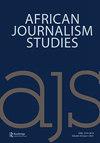Radio and Social Media as A Two-Way Communication Tool in Conflict- and Pandemic-Affected Communities in Burkina Faso
IF 1.8
3区 文学
Q3 COMMUNICATION
引用次数: 1
Abstract
ABSTRACT The article draws on the concepts of “felt needs” and “politics of listening” widely used in community development and applies them more broadly to the humanitarian crisis suffered by internally displaced persons in Burkina Faso. It investigates the two-way communication stream between radio journalists and listeners drawing on feedback collected remotely from 153 representatives of internally displaced and host communities in Burkina Faso during COVID-19. It argues that while a voice must be given to marginalised communities, it must also be listened to and acted upon. Rather than radio journalism being a loudspeaker for top-down messaging, the study argues that alternative approaches should be adopted in conflict- and pandemic-affected areas. It finds that a balance is needed between the information that listeners feel they need in their new extreme circumstances and the information that radio journalists, drawing on their expertise, feel would be strategically empowering.无线电和社交媒体作为布基纳法索受冲突和流行病影响社区的双向沟通工具
本文借鉴了社区发展中广泛使用的“感受需求”和“倾听政治”概念,并将其更广泛地应用于布基纳法索国内流离失所者所遭受的人道主义危机。该研究利用在2019冠状病毒病疫情期间从布基纳法索境内流离失所者和收容社区的153名代表那里远程收集的反馈,调查了电台记者和听众之间的双向通信流。它认为,虽然必须给予边缘化社区发言权,但也必须听取他们的意见并采取行动。该研究认为,在受冲突和流行病影响的地区应该采用替代方法,而不是将广播新闻作为自上而下传递信息的扩音器。报告发现,听众认为他们在新的极端情况下需要的信息与利用其专业知识的广播记者认为将在战略上赋予权力的信息之间需要保持平衡。
本文章由计算机程序翻译,如有差异,请以英文原文为准。
求助全文
约1分钟内获得全文
求助全文
来源期刊

African Journalism Studies
COMMUNICATION-
CiteScore
1.90
自引率
10.00%
发文量
18
期刊介绍:
Accredited by the South African Department of Higher Education and Training for university research purposes African Journalism Studies subscribes to the Code of Best Practice for Peer Reviewed Scholarly Journals of the Academy of Science of South Africa. African Journalism Studies ( AJS) aims to contribute to the ongoing extension of the theories, methodologies and empirical data to under-researched areas of knowledge production, through its emphasis on African journalism studies within a broader, comparative perspective of the Global South. AJS strives for theoretical diversity and methodological inclusivity, by developing theoretical approaches and making critical interventions in global scholarly debates. The journal''s comparative and interdisciplinary approach is informed by the related fields of cultural and media studies, communication studies, African studies, politics, and sociology. The field of journalism studies is understood broadly, as including the practices, norms, value systems, frameworks of representation, audiences, platforms, industries, theories and power relations that relate to the production, consumption and study of journalism. A wide definition of journalism is used, which extends beyond news and current affairs to include digital and social media, documentary film and narrative non-fiction.
 求助内容:
求助内容: 应助结果提醒方式:
应助结果提醒方式:


